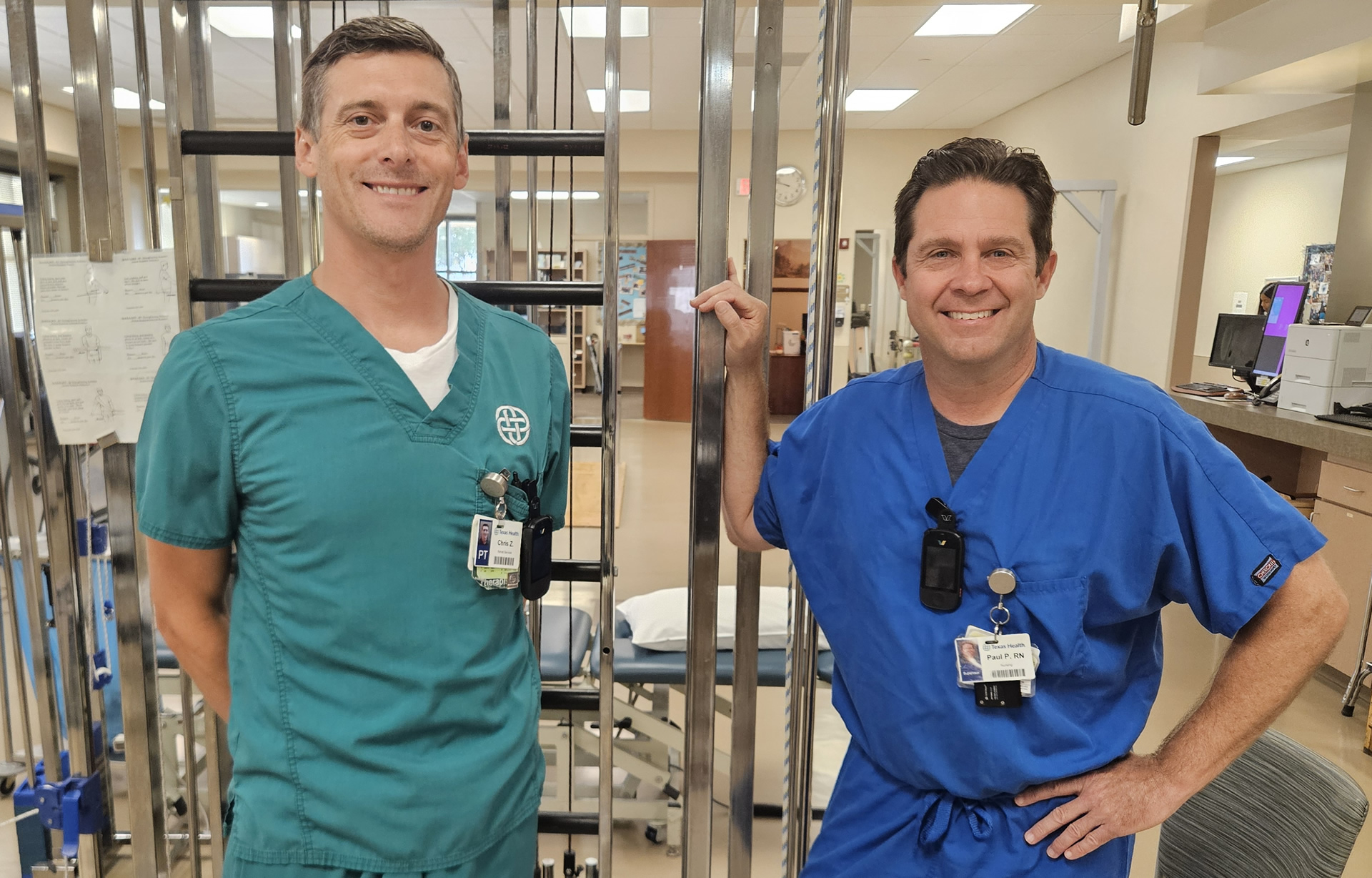ARLINGTON, Texas — The leading cause of injury for people 65 or older are falls — with 1 in 4 older adults reporting them every year, according to national statistics.

Chris Zoll, left, and Paul Palermo
Lowering these statistics is the focus of fall prevention education campaigns during Falls Prevention Awareness Week, which is being observed nationwide Sept. 23-27. Educating communities and providing resources for recovery when an accident happens are among Texas Health Resources’ outreach efforts in North Texas communities.
“Pets, rugs on a hardwood floor and dizziness from medications can lead to a fall and serious injury,” said Paul Palermo, B.S.N., R.N., CEN, a nursing supervisor in the Emergency Department at Texas Health Harris Methodist Hospital Southwest Fort Worth. “For older patients, a hip or rib injury can lead to more serious health complications.”
In 2023, Texas Health emergency departments had 36,539 visits related to injuries from falls, or 4.8% of 768,635 total visits. Patients were treated for a variety of fall-related injuries, including ankle dislocations and broken arms, ribs and hips.
Often, a patient’s post emergency recovery includes seeing a physical therapist and learning how to prevent another fall.
“An accident can happen very fast,” said Chris Zoll, PT, M.S., a therapy coordinator at Texas Health Southwest. Mending from a fall depends on the type of injury, Zoll said. Typically, a broken bone can take six to eight weeks to heal.
“The main thing to remember while you're healing from an injury is that as humans we can lose our strength in the blink of an eye,” Zoll said. “It takes us much longer to build it back. Andthat's not because of your age or because you've been sick with X, Y and Z. It's simply because you're human, and every human is like that.”
Recovery from an injury
After a fall, patients experience pain that makes it difficult to move around, but moving is the key to recovery.
“The first day or two of getting up and moving might be the worst, because you're that stiff and in pain,” Zoll said. “You may also be unsure of yourself, because you've lost your confidence, and you may be afraid you're going to fall again.”
For example, patients who are recovering from leg injuries are encouraged to walk as much as they can, adding more distance each time.
Zoll said patients also are encouraged to sit upright – a position that helps the entire body.
“Your lungs expand larger when you're upright,” he said. “Your circulation is better. You're building strength and endurance.”
These efforts to build mobility help prevent pressure ulcers and blood clots, Zoll said.
Fall prevention
Exercise and building more muscle helps prevent falls by improving coordination.
“Walking is your best friend,” Zoll said. “Go for daily walks and focus on the length of time that you're able to walk without taking a rest.”
Additionally, getting aches or balance issues checked out by a primary physician can help prevent a serious injury from falling. The physician may determine that physical therapy would be helpful and submit an order for an outpatient visit, Zoll said.
“Maybe you are feeling like, ‘My balance is going away just a little bit,’ or ‘I feel unsteady during these situations, and I didn’t feel this way just a month ago,’” Zoll said. “That's when you want to see a physical therapist. Go before you fall and fracture your hip or break your wrist.”
Resources
To find a healthcare provider: TexasHealth.org/FindAPhysician. Learn more about Physical Therapy and Rehabilitation services at Texas Health.
Related News
About Texas Health Resources
Texas Health Resources is a faith-based, nonprofit health system that cares for more patients in North Texas than any other provider. With a service area that consists of 16 counties and more than 8 million people, the system is committed to providing quality, coordinated care through its Texas Health Physicians Group and 29 hospital locations under the banners of Texas Health Presbyterian, Texas Health Arlington Memorial, Texas Health Harris Methodist and Texas Health Huguley. Texas Health access points and services, ranging from acute-care hospitals and trauma centers to outpatient facilities and home health and preventive services, provide the full continuum of care for all stages of life. The system has more than 4,400 licensed hospital beds, 6,400 physicians with active staff privileges and nearly 29,000 employees. For more information about Texas Health, call 1-877-THR-WELL, or visit www.TexasHealth.org.
